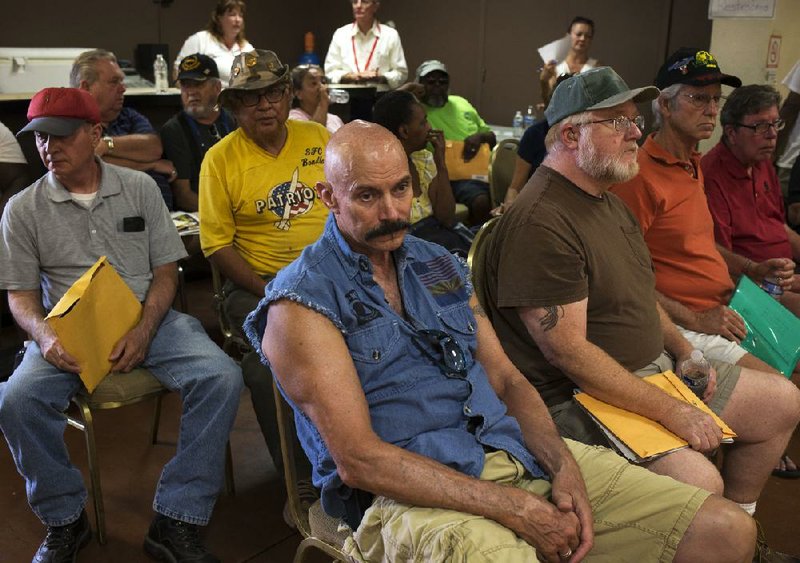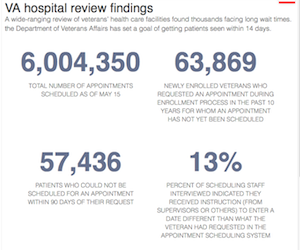WASHINGTON -- The House of Representatives unanimously approved legislation Tuesday to make it easier for patients enduring long waits for care at Veterans Affairs facilities to get VA-paid treatment from local doctors.
The Senate was poised to vote on a similar bill within 48 hours, said Senate Majority Leader Harry Reid, D-Nev.
The legislation followed a Veterans Affairs Department audit showing that more than 57,000 new applicants for care have had to wait at least three months for initial appointments and an additional 64,000 newly enrolled veterans who requested appointments never got them.
"I cannot state it strongly enough: This is a national disgrace," said Veterans' Affairs Committee Chairman Jeff Miller, R-Fla., chief author of the House legislation.
Miller made his comments minutes before the House completed the first of two votes on its measure. Lawmakers approved the bill 421-0, then revoted a little more than an hour later, with five more in favor and no one against.
Miller admitted the reason for the second vote: He was in his office and missed the first tally.
Rep. Mike Michaud of Maine, top Democrat on the Veterans' Affairs Committee, said the care veterans receive at VA facilities is "second to none -- that is, if you can get in. As we have recently learned, tens of thousands of veterans are not getting in."
The House bill and a similar version in the Senate would spend hundreds of millions of dollars to hire more doctors and nurses, but some lawmakers said that may be easier said than done given a nationwide shortage of primary-care physicians.
"This is not a problem that is just isolated to the VA," said Rep. Dina Titus, D-Nev. "It's out there in the community."
Primary-care physicians are expected to become increasingly in demand as millions of people newly insured under the federal health-care law start looking for regular doctors. The Association of American Medical Colleges has projected that by 2020, there will be 45,000 too few primary-care physicians, as well as a shortage of 46,000 surgeons and specialists.
Shortages tend to be worse in rural and inner-city areas.
Nevada already has a chronic shortage of doctors in primary care and among specialists, Titus said. The state ranks 46th among states and the District of Columbia for availability of general and family practitioners, she said, and 51st for surgeons.
While she voted for the bill, Titus said Congress and the Obama administration need to do more to ensure veterans receive care in the private sector.
House Republicans have responded to the VA problems by promoting a dozen veterans-related bills that passed in recent months and await Senate action. Those include a proposal to make it easier to dismiss VA officials for misconduct and another that would freeze bonuses for senior VA officials through fiscal 2018.
The American Medical Association added its voice to the issue as the House was voting Tuesday. At its annual policy meeting in Chicago, the nation's largest doctors group approved a resolution urging President Barack Obama to take immediate action to enable veterans to get access to care from outside the VA system. It also recommended that state medical societies create and make registries of outside physicians willing to treat veterans.
"Clearly there is a problem," said Dr. Robert Wah, the group's incoming president. He didn't say how Obama should ensure veterans get access to non-VA doctors, but he said the president needed to address the issue immediately.
Sen. John McCain, R-Ariz., a chief author of the Senate's VA bill, said he believed the chamber would approve it in the next day or two, adding that it shouldn't be hard for the two chambers to craft a compromise version.
"I don't think there's a lot of major differences," McCain said.
Sen. Bernie Sanders, I-Vt., chairman of that chamber's Veterans Affairs Committee, said that by Senate standards, lawmakers are moving at "lightning speed."
The Senate bill would authorize the VA to lease 26 new health facilities in 17 states and Puerto Rico, and spend $500 million to hire more doctors and nurses. The House bill does not include a specific dollar amount, but Miller said the VA would save $400 million annually by eliminating bonuses, money the agency could use for expanded care.
The House and Senate bills would allow veterans facing long delays for appointments or living more than 40 miles from a VA facility to get care from nonagency providers for the next two years. Some veterans already get outside care, but the process is cumbersome and riddled with delays, veterans and their advocates have said.
Both bills target bonuses awarded to VA employees who meet certain performance goals. The House version would ban bonuses outright through 2016, while the Senate would block bonuses based on prompt scheduling of patients' appointments -- a practice investigators say led some officials to create fabricated statistics on patients' waits for medical appointments.
Sloan Gibson, acting Veterans Affairs secretary, said at least 18 veterans died while awaiting medical care in Phoenix, while falsified data showed waits that were much shorter than in reality. Miller has said there were as many as 40 deaths.
The controversy over the phony waiting lists led Eric Shinseki to resign as head of the VA, which serves almost 9 million veterans, on May 30.
The agency has started removing top officials at its medical facility in Phoenix, and investigators have found indications of long waits and falsified records of patients' appointments at many other facilities.
Richard Griffin, acting VA inspector general, told lawmakers his investigators were probing for wrongdoing at 69 agency medical facilities, up from 42 two weeks ago. He said he has discussed evidence of manipulated data with the Justice Department, which he said was still considering whether crimes occurred.
Meanwhile, the Obama administration is searching for someone to oversee the department and its $160 billion budget, the fifth-largest of any federal agency. Cleveland Clinic Chief Executive Officer Delos "Toby" Cosgrove took himself out of the running to replace Shinseki on Saturday.
"This is a large task," White House spokesman Josh Earnest said. "There's no sugar-coating that."
Information for this article was contributed by Matthew Daly, Alan Fram, Lauran Neergaard and Lindsey Tanner of The Associated Press; and by Michael C. Bender, Roger Runningen, Kathleen Hunter and Derek Wallbank of Bloomberg News.
A Section on 06/11/2014


